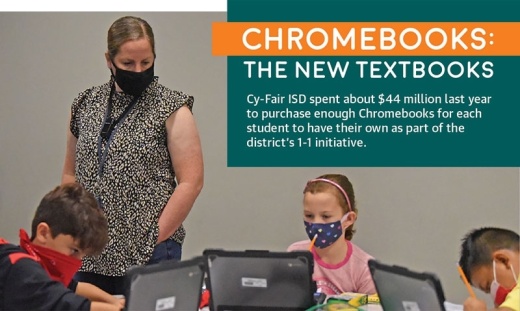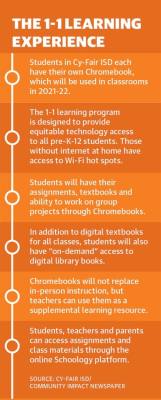Google Chromebooks were distributed last school year as many families opted for remote learning over in-person instruction. In the upcoming school year, these devices will be incorporated into the classroom experience.
District officials said these devices will be used for day-to-day assignments and textbook access as all students return to the classroom Aug. 23. CFISD invested about $44 million last year to purchase these devices as well as Wi-Fi hot spots for those who did not have internet access at home.
“1-1 technology will provide the opportunity for teachers to personalize further learning in the classroom through individualized assignments, including supporting dynamic interaction with content through collaboration, creation, and exploration,” Chief Academic Officer Linda Macias said.
While the exclusively remote learning program in 2020-21 worked for some students, officials said they believe it was not successful for the majority, who generally performed better in the traditional classroom setting. About 55% of students were in CFISD’s remote learning program at its peak.
“While some students thrive in a virtual learning environment, that is not the case for the majority of students,” Macias said.
In May, the district proposed a tuition-free, full-time, standalone school for students in grades 4-12 living within the district’s boundaries.
In addition to the 87th Legislature not funding remote learning through House Bill 1468, Macias said there was low interest from CFISD students to enroll in exclusively remote learning after last year. Approximately 180 students applied for the virtual school program in CFISD when it was proposed, and less than 60% of those who applied met the required qualifications, she said.
“It reminded everyone that a device does not replace the teacher,” Macias said. “Technology enhances student engagement and expands learning opportunities.”
However, 1-1 learning allows students to learn from their own devices for a more personalized experience in and out of the classroom. Macias said Chromebooks will help teachers facilitate individualized assignments and support further engagement with content. Students will have textbooks available in digital format for all assigned classes and have on-demand access to digital library books.
Technology in the classroom
The challenges faced with virtual learning during the pandemic were seen by parents and teachers in Cy-Fair. Donna Lord, Cy-Fair Texas State Teachers Association president and Cook Middle School teacher, said it was difficult to engage learners from home during the pandemic.
She said her students were not keeping their cameras on, and it was a struggle to gauge their academic progress. She said students, especially at the middle school level, have to be self-motivated to be successful in online learning instruction.
In CFISD, 32% of remote students in second to 12th grades failed at least one class in the fourth grading period of 2020-21, compared to 17% of students learning in person, according to district data. Although Lord said she is relieved hybrid learning will not be continuing this school year, she believes the district made the right decision to adopt technology in the classroom.
“It’s very different than what we’ve traditionally done,” she said. “But I think it’s going to be a good thing.”
With the assistance of Chromebooks and the 1-1 program, teachers can routinely incorporate technology into daily instruction, and individual student devices expand the opportunities for teachers to personalize student learning, Lord said. Students are no longer limited to engaging with academic content during the school day. Through the digital platform Schoology, students are able to access instructional content 24/7.
Accessing assignments is fairly simple, Macias said, and does not require remembering separate sign-in passwords or web addresses. This makes it easier for parents to support their children through easy access to instructional materials, resources and extensions in learning, she said.
Macias also said 1-1 learning has broken down barriers regarding technology access. According to the results of a parent survey last August, 10% of students did not have internet access at home, and 50% of students did not have their own device before the initiative.
While incorporating laptops and tablets may have been long overdue, Lord said maybe it took the pandemic to make students and educators comfortable with using technology in the classroom.
“There’s a lot of good things that came out of technology that many of us probably didn’t really think about until we were forced into this situation,” she said.

Funding devices
CFISD invested about $44 million to purchase Chromebooks and internet hot spot devices for students last summer. District officials said they had about 40,000 Chromebooks on hand last July and sought to purchase another 75,000 devices. All Chromebooks were acquired and distributed to students by the end of the spring semester.
The district is eligible to be reimbursed for up to $19.1 million in new technology costs through the federal Coronavirus Relief Fund Prior Purchase Reimbursement Program, Chief Financial Officer Karen Smith said. CFISD had applied for reimbursement but had not received it as of press time.
In CFISD, technological advancements rely on bond initiatives, according to Paula Ross, the district’s assistant superintendent of technology and information services. The technology department maintains an annual operating budget that covers the cost of infrastructure applications, license renewals and maintenance costs for a variety of software and hardware, Ross said.
In 2019, a $1.76 billion bond referendum passed, of which nearly $239 million was dedicated to technology. Funding covers classroom technology, infrastructure replacements and additions, wireless devices for classrooms, lending devices for libraries, elementary large-group sound systems, special education, and flex-space technology and cybersecurity measures, she said.

Remote learning lacks approval
State Rep. Jon Rosenthal, D-Houston, supported HB 1468, which would have provided funding for school districts to offer virtual learning programs beyond 2020-21.
“This bill would have provided more flexibility for our teachers, for our students [and] for our administrators,” Rosenthal said. “And I think people are generally in favor of that.”
Rosenthal said moving forward, he is expecting to hear more feedback from parents at school board meetings regarding the virtual program no longer being an option. He said the bill could be reconsidered, although it was not included on the special session agenda this summer.
Additionally, Rosenthal said he saw firsthand the benefits of virtual instruction with his nephew, a special needs student who thrived in a remote learning experience working at his own pace. He said making a hybrid model—in which teachers taught students in class and online simultaneously—was a difficult task for educators.
“It seems to me like it would be a waste to throw away what we have learned,” he said.
CFISD parents David and Aly Fitzpatrick were hopeful remote learning would be an option for their immunocompromised twin boys in the upcoming school year. Children younger than age 12 are not yet eligible for the COVID-19 vaccine, but the couple’s only choice now is sending their sons back to in-person learning with masks.
“We’re just going to let them go back to in-person [learning] and hope for the best,” David Fitzpatrick said.
State Rep. Dan Huberty, R-Houston, also supported HB 1468 and said he was disappointed the bill did not pass.
Huberty said he believes districts need to adopt technology in the classroom and provide students with tablets or laptops for instructional purposes. Instead of spending hundreds of millions of dollars on textbooks that sit in a warehouse, he said, students would be able to take home a device filled with all the course material from these textbooks anytime they want or need them.
He said the new devices provided for students will help parents out financially that may not have the means to purchase them for their child. Despite his support for remote learning opportunities, Huberty said he believes the in-person learning experience will be healthier for the relationship among parents, teachers and students.
“Nothing substitutes for in-person education,” Huberty said.






